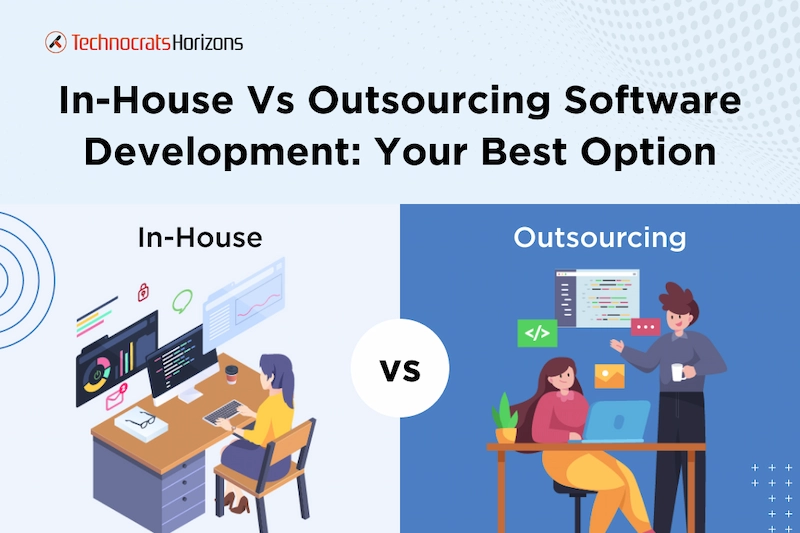Software development has become a common business need for companies of all sizes all around the world. Most companies and agencies are constantly grappling with in-house or outsourcing dilemmas. To make the best decision, it’s important to compare in-house vs outsourced software development in detail. The key lies in understanding the advantages and disadvantages of both approaches.
Finding the right software development expertise can be challenging, especially for companies with time and money constraints. This is a major reason why many companies opt for outsourcing software development. Creating an internal team requires a significant amount of effort and time.
BusinessWire research also highlights that 36% of software development is already being outsourced.
To make an informed choice for your software development needs, it’s essential to understand the aspects of both approaches. Let’s analyze the pros and cons of in-house vs. outsourced software development to determine the best option.
In-House Vs Outsourcing Software Development: A Comparison
At its core, the difference between in-house vs outsourcing lies in where the work happens. In-house software development involves internal teams crafting software within the company premises. On the flip side, outsourced software development entails external teams handling projects hired from outside. But with the ever-changing software development landscape, choosing between these two has become a whole new ball game.
Looking ahead, the software development market is projected to surge by 25% faster in 2031 compared to today.
This indicates that the pace of industry growth will only accelerate further in the coming years. Simultaneously, outsourcing is gaining traction.
This shift signifies that outsourcing has evolved into a more pragmatic and widely accepted approach than it used to be, owing to several compelling reasons.
In-House Software Development
In-house software development involves the development of software solutions for a business or organization using an internal team of developers. This approach keeps the ownership of the software’s design, features, and functionality within the company rather than outsourcing it to a third-party vendor.
It allows tailoring the software to meet the company’s specific needs, providing greater customization and flexibility. However, this method demands significant resource investment, including recruitment and training of developers, provision of facilities and equipment, and overseeing the development process.
Pros of In-House Development:
-
-
Cultural and Language Alignment
-
When forming an internal team, there are no language or cultural barriers. Typically, the newly recruited developers are from the same town or country and time zone as the rest of the staff. This shared language and cultural background facilitate smooth communication within the organization. It also leads to a synchronous company culture.
-
-
Enhanced Agility
-
Internal developers assess the project, make changes to features, and rapidly develop new ones. Internal teams play a crucial role in addressing issues more promptly. You won’t need to wait for extended periods—hours, days, or even weeks—to have problems in your project resolved.
-
-
Better Communication
-
Communication becomes simpler and more direct when everything is confined within your team, particularly when working in close proximity in the same physical space. In-house adjustments or collaborative efforts can be executed much more swiftly without the delays or lack of nuance often found in emails and chat apps to outsourced teams.
-
-
Security
-
By ensuring that all data and intellectual property remain within the company, the risk of targeting by fraudsters is reduced. This also lessens the challenges associated with maintaining information security.
Cons of In-house Development
-
-
Costs
-
Employing full-time software developers can be quite expensive, particularly in certain countries where annual salaries often exceed $100,000 (especially in the United States). Added costs encompass holiday pay, sick leave, social security contributions, onboarding, ongoing training, recruitment, and more. This might not be a cost-effective utilization of funds unless you have a consistent flow of projects for them to handle.
-
-
Skills Shortages
-
As HR managers grapple with recruiting from a limited pool of qualified developers, attracting and retaining skilled software development professionals has become tougher than ever. Moreover, even if you manage to attract them, retaining them over the long term can be challenging due to high demand.
-
-
Recruitment Challenges
-
Depending on your geographical location, finding the right talent can be a challenge. For instance, locating proficient software engineers in areas with a scarcity of tech talent can prove difficult. Furthermore, the hiring process itself can be costly and time-consuming.
-
-
Instability
-
Due to the escalating demand for developers and the attractive offers made by other companies, this trend is accelerating. Consequently, there’s always a possibility that your lead developer might switch industries during a critical project phase.
Initially, hiring new in-house staff might appear as a favorable choice compared to outsourcing. However, there are inherent difficulties in the pursuit of expertise.
Outsourcing Software Development
Outsourcing software development is an alternative approach to fulfilling your company’s technological requirements, different from the in-house strategy we just discussed. Outsourcing involves engaging an external company or freelancers to manage your software development needs.
This stands as an alternative to recruiting and internally developing software. Along with its pros, we will also be discussing the disadvantages of outsourcing below:
Pros of Outsourcing Development
-
-
Quick Time to Market
-
External software development offers the advantage of quick software development. The resources of an external team allow you to continuously enhance your product’s features. There are no limitations imposed by the developers’ skills and resources, resulting in a shorter gap between production and launch. Unlike the in-house development team, which requires a recruitment process of 2-3 months, outsourced developers start working immediately to expedite your project’s time to market.
-
-
Access to Global Talent Pool
-
Through outsourcing, you gain access to a broader talent pool as geographical barriers are eliminated. Whether you need an expert in a specific industry or a specialist in a unique technology, outsourcing can connect you with the right professionals regardless of their location.
-
-
Flexibility
-
Outsourcing provides the flexibility to scale your team up or down based on project requirements. This adaptability ensures optimal productivity and cost-efficiency – you can reduce resources when needed and add more during peak demand periods.
-
-
Cost Savings
-
Cost savings is one of the most crucial factors when choosing between in house vs outsourcing. Engaging an outsourcing company is generally more cost-effective than hiring internal IT specialists, facilitating better budget management. Additionally, by utilizing a remote workforce, clients can reduce expenses related to office administration, business overhead, human resources, and other in-house employment costs.
Cons of Outsourcing Software Development
-
-
Meeting Deadlines
-
Missing deadlines is a recurring issue with some outsourcing software development teams. Many teams often cite time consuming processes or budget constraints as the reason behind missing deadlines.
How to Prevent It?
One effective approach is to hire a Chief Technology Officer (CTO) responsible for overseeing the technical aspect of the project. This ensures that the entire team remains on course, especially when entrepreneurs are occupied with other responsibilities.
-
-
Escalating Costs
-
There are instances when outsourced software development projects end up being more expensive than initially estimated. This primarily arises from inadequate prioritization of business features. The hired company might perceive a lack of experience in the software technology domain and exploit the situation.
How to Prevent It?
As previously mentioned, if the outsourcing team lacks authenticity, there’s a risk of being misled. To counter this, having an in-house technical software specialist from your company who can effectively communicate with the outsourcing team is crucial and keep the costs in check.
-
-
Quality Assurance
-
This is the most pondered-upon aspect of the in house vs outsourcing debate. While numerous highly qualified outsourcing companies are available, occasional quality control issues may arise. Monitoring the project’s quality can be more challenging when the team is not physically present in your office.
How to Prevent It?
Make sure that the team or company you are hiring provides quality assurance as part of the package. When signing the outsourcing contract, it is advisable to state these terms and conditions.
-
-
Data Security Risks
-
It is one of the most significant risks of outsourcing out there. Outsourcing involves sharing sensitive data with a third party, which can pose potential risks to data security.
How to Prevent It?
It’s crucial to protect your intellectual property, so ensure that the outsourcing company has robust security protocols in place. Whenever you outsource work, it is crucial that you sign a confidentiality agreement.
Seeking Cost-Effective Software Development? Choose Us!!
When to Opt for Outsourcing Development?
-
-
Lack of Necessary Skills
-
If your business is facing a shortage of talent, you can choose to outsource your projects. Hiring, training, and retaining personnel to meet your evolving needs might require significant investment. In such cases, outsourcing development needs can be advantageous, allowing you to leverage the expertise of external professionals and achieve high quality outcomes.
-
-
Lack of Infrastructure
-
As technology evolves, it brings along increasing infrastructure demands. When your company faces consistent expenses for technology requirements, it’s advantageous to engage an outsourcing provider to efficiently manage all your business needs.
-
-
Budget Constraints
-
When operating within a tight budget, outsourcing offers greater flexibility in managing your cash flow and avoiding ongoing expenses. Furthermore, hiring an external IT team is more cost-effective than establishing an internal one.
-
-
Tight Deadlines
-
If you lack prior experience in software development, you might encounter unexpected obstacles. Collaborating with a skilled outsourcing provider that possesses expertise in similar projects or deliverables will assist you in preventing delays that could jeopardize meeting your deadlines.
-
-
Lack of Clarity
-
Developing a complex IT solution involves significant effort, even with in-house experts. The process of translating business requirements into technical specifications can hit a roadblock. An outsourced vendor’s business manager often liaises between you and the developers, ensuring clear communication and direction.
Getting the Best of Both Worlds: In-House vs Outsourcing
You don’t have to choose between in-house software development and outsourcing. Many companies find value in a hybrid approach that combines internal and external expertise. Outsourcing works well for specific tasks needing specialized skills or quick execution, while in-house teams focus on core business functions aligned with strategic goals.
This balanced approach offers cost efficiency, quality control, and strategic flexibility. Success depends on clear communication and responsibilities between in-house and outsourced teams. In-house development offers control, customization, and data protection, while outsourcing provides cost-effectiveness, global talent access, and speed.
Crucially, it’s not an all-or-nothing choice—many businesses use a hybrid model, benefiting from both options. Have you decided between in-house vs outsourcing software development? Effective communication, alignment with goals, and careful partner selection can ensure project success.
Why Choose Technocrats as Your Outsourcing Partner
After discussing the pros and cons of outsourcing and in-house software development, we hope you can move beyond your in house vs outsourcing discussion. When it comes to outsourced software development, Technocrats is your best option. With 12 years of experience, we are equipped to handle any project. Our proficient development team ensures tasks are completed on time and within budget.
We take pride in our unique approach, utilizing Agile methodology to enhance efficiency and reduce risks by up to 90%. Moreover, we harness a range of technologies to streamline your business processes. At Technocrats, we do not just offer our outsourced services, we offer comprehensive expertise!
Ready to Save Time, Effort, and Resources? We're Here To Help!!
Boost your capacity and productivity now!
We’d like to guide you on how to optimize your outsourcing needs with our expertise.











 Request a
Request a




























